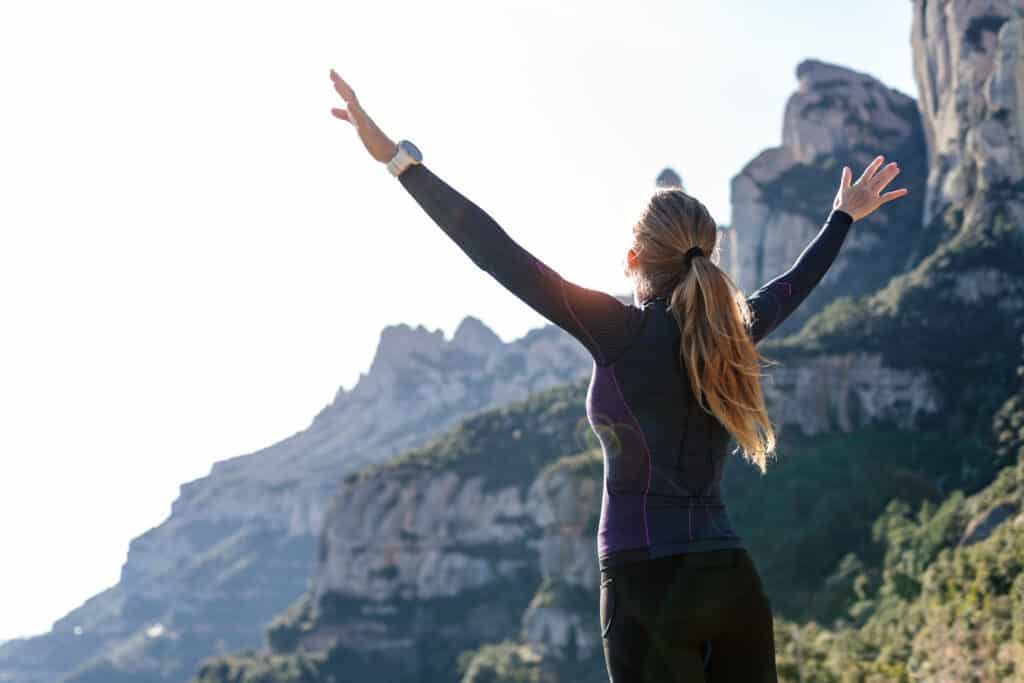
Hiking is a popular activity that heavily involves your entire body. Although it is well-known that hiking benefits your health, the exact health benefits aren’t as prominent. More so, few people know why those health benefits are essential.
Whether you’re already an avid hiker or are looking for a reason to start hiking, there are profound health benefits to consider. Here you can learn about nine different hiking health benefits and why they matter. Let’s dive in!
- Lower the Risk of Heart Disease.
- Improve Blood Pressure.
- Strengthens Core.
- Strengthens Bones.
- Helps Build Strength.
- Decrease Risk of Respiratory Issues.
- Improves Mental Health.
- Provides Stress Relief.
- Weight Loss.
1. Lower the Risk of Heart Disease
Hiking lowers the risk of developing various heart diseases, such as coronary, congestive, and congenital heart diseases. Additionally, hiking reduces your chances of having a heart attack. Heart disease is the leading cause of death in the United States, so you need to prioritize your heart health. If you enjoy hiking and do it often, you are already improving your heart health.
If you want to improve the health of your heart, hike where there is a series of inclines and declines. According to a Harvard study, hills and uneven ground make your heart work harder, strengthening it and improving its endurance. Think of your heart as a muscle. The harder it works and the more exercised, the stronger it becomes. A strong heart is less likely to experience health problems.
study, hills and uneven ground make your heart work harder, strengthening it and improving its endurance. Think of your heart as a muscle. The harder it works and the more exercised, the stronger it becomes. A strong heart is less likely to experience health problems.
2. Improve Blood Pressure
Hiking improves your blood pressure. High blood pressure is a sign that your heart is in distress. According to the American Hiking Society, hiking can reduce your blood pressure by 4 to 10 points. This can make a huge difference for those who have high blood pressure.
If you are trying to control your blood pressure, go on a hike at least once a week. Start slow with an easy hike that is relatively flat and has a trail that is easy to walk across. Over time you should increase the intensity of your weekly hike. Doing this will help regulate your blood pressure.
If you think that you have high blood pressure or have been diagnosed with it by a doctor, talk to your doctor about what exercises you can do to improve your health. I start with a hike that is too intense. Your blood pressure may rise, which can be dangerous, especially if your blood pressure levels were extremely high before the walk.
Reducing your blood pressure levels has significant health benefits. However, it also has profound lifestyle benefits too. With lower blood pressure, you can enjoy more foods and activities than you could before, all without the risk of a heart attack or another catastrophic heart-related event.
3. Strengthens Core
Hiking strengthens your core. Strengthening your core improves your balance, stability, flexibility, and posture. If you are clumsy and want to become less so, go hiking regularly.
Balance is essential, especially if you have fallen and become injured because of it in the past. If you have been previously injured in a fall and want to improve your balance through hiking, start with easier, relatively flat trails. As your balance improves, you can hike on wilder, rougher trails. Your improved balance (and strengthened core) will help you avoid tripping or falling.
If you have had ankle or knee injuries in the past, wait until you are fully recovered before you start hiking. Start small with one hike a week. As your balance improves and your leg muscles strengthen, the likelihood of you injuring your ankle or knee again reduces as the muscles strengthen.

Pay attention to any injuries.
You may have to wear a knee or ankle brace for the first few months so. Doing so will help the injured joint ease back into exercise. After a few months, you likely won’t have to wear the brace anymore.
If your core is strong, you will have better posture, which will help reduce any back pain that you have. If you suffer from extreme back pain, go on hikes regularly. If you need supplies for your hike, only take a small backpack. If you start with a heavy backpack it could further injure your back. As you become a more experienced hike, you can slowly increase the weight of your pack.
Hiking strengthens your core muscles, especially your lower back. This is one of the reasons why hiking helps reduce back pain. As the muscles in your lower back strengthen they can better support your entire spine. Pay close attention, after a month or so of hiking once a week, your back will start to hurt less on a daily basis.
If you want to improve your posture for various reasons, go hiking at least once a week. Your core will become stronger and you will find that your posture becomes straighter over time.
4. Strengthens Bones
When you go hiking regularly, your bones become stronger. It might surprise you to hear that you can have weak bones. If you have experienced several broken bones, chances are, your bones are weak. You can strengthen your bones by going hiking at least once a week. Over time, you will notice an improvement in bone strength.
It is important to have strong bones. Our bones protect all of our vital organs from injury. Additionally, our bones are the only reason we can move around. If you have weak bones, you might find it more difficult to move around.
Your bones support your muscles. If you want to strengthen your muscles you need to strengthen your bones first. Your muscles need a strong support system before they can get stronger.
If you suffer from osteoporosis, go hiking frequently. Although you will likely be in quite a bit of pain at first, the hiking will help improve the strength of your bones over time, reducing your symptoms and pain. The density of your bones may even increase after consistent hiking. This would mean less pain and a lower risk of breaking any bones.
It will take at least 9 months for the effects of your hikes to be seen in your bones, but the end result will be worth it. Be careful when you go on your hikes. You don’t want to trip and break a bone early into the process. If you break a bone, you will have to stop all progress until you’re recovered and then start from scratch once a doctor clears you for hiking again.
5. Helps Build Strength
When you go on hikes frequently, your muscles become stronger. Hiking specifically strengthens the quadriceps, glutes, hamstrings, hips, calves, and thighs. Hiking frequently will tone and build muscle in your legs.
If you hike with trekking poles, hiking can strengthen your arm muscles as well. With stronger arms, you can lift heavier weights with a reduced risk of serious injury.
Although hiking may be hard in the beginning, as you become stronger it will become easier. You will be able to go on longer hikes, to destinations that are harder to reach. This means you will be able to explore further than you ever did before. All the best views are hidden at the end of an intense hiking trail, such as waterfalls and mountain summits. If you have a dream hiking destination, make it a goal to go there someday and start with smaller hikes to train for it! Never start with an intense hike, chances are you will feel exhausted before you complete the hike.
6. Decreases Risk of Respiratory Issues
Many people suffer from at least one kind of respiratory issue, such as asthma or emphysema. According to the National Park Service, If you go hiking regularly, you reduce your risk of developing a respiratory problem.
When you work your cardiovascular system, your lungs and heart work harder than normal, strengthening them over time. Hiking also strengthens your core muscles, including the diaphragm. The stronger your diaphragm is, the stronger your lungs are. The stronger your lungs are, the less likely you are to develop any respiratory problems. At the very least, your lungs will be strong enough to endure respiratory problems.
Hiking improves your physical fitness level. If you are physically fit, it is easier for your lungs and heart to pump blood and oxygen to your entire body. We often refer to this feeling as “being in shape.” The more in shape you are, the less you’ll feel out of breath.

7. Improves Mental Health
Hiking improves your mental health. According to a Stanford study that was published in the Proceedings of the National Academy of Science, hiking in nature for at least 90 minutes decreases activity in the areas of the brain associated with depression.
that was published in the Proceedings of the National Academy of Science, hiking in nature for at least 90 minutes decreases activity in the areas of the brain associated with depression.
If you suffer from depression or anxiety, go on hikes one or more times a week. You can also sit in a park or natural area, but hiking promotes blood flow to the brain and will help you feel more energized and clear-headed.
“In fact, city dwellers have a 20 percent higher risk of anxiety disorders and a 40 percent higher risk of mood disorders as compared to people in rural areas. People born and raised in cities are twice as likely to develop schizophrenia.”
Rob Jordan, Stanford Woods Institute for the Environment
One of the reasons why people suffer from anxiety is because of a build-up of adrenaline. If adrenaline isn’t released from your body, it accumulates and causes your muscles to become tense. It also causes you to feel like you are almost constantly in danger, even if you aren’t.
Hiking releases your stored adrenaline, due to the increase in blood flow and oxygen intake it creates. During your hike, and for at least a few hours afterward, you will feel more relaxed.
Hiking helps your mind focus on things other than the stressful situations you may currently be dealing with. While on your hike, surrounded by nature, your mind can relax for a few hours.
According to the American Hiking Society, when you work out or go on a walk, your body releases endorphins. Endorphins are chemicals that signal to your brain to feel happy and relaxed. If you have higher endorphin levels, it will reduce any feelings of anxiety or depression.
If you struggle with mental health problems, try going on hikes more frequently. Need some instant relaxation? Find the nearest nature walk or beginner level hike and start walking! By the end of it you will feel more relaxed and comfortable. When you are going through a particularly difficult time, it is especially important to make hiking part of your routine.
8. Provides Stress Relief
Being outside in nature helps you feel more relaxed and reduces your stress levels. Have you ever noticed that when you are in a park, you feel more relaxed? That isn’t just because you are away from stressful situations, you feel more relaxed because you are happier and more comfortable in a natural area than an urban one.
Hiking also helps you use any excess energy that you have that may be causing you to feel extra stressed or anxious. If you suffer from high-stress levels, make hiking a part of your routine.
9. Weight Loss
Hiking can be a moderate to an intense workout. Even if you only hike on nature trails, this works your legs, core, and cardiovascular system. This exercise burns fat and increases the amount of muscle that you have.
If you suffer from obesity or are close to becoming obese, go hiking regularly. Try going for an easy hike once a week. When that hike becomes too easy for you, increase the difficulty slightly. Continue increasing the difficulty as you feel stronger. If you don’t have any hiking trails near your home, start by walking on the path in the park or just around the block a few times.
Hiking is an excellent workout for those looking to lose weight regardless of their experience level or physical condition. As mentioned above, you can start with a less intense hike or walk. Once you start losing weight and building muscle strength, you can increase the difficulty.
Hiking is especially good for weight loss because it builds muscle. Once you have strong muscles, they burn body fat to maintain themselves. However, this also requires you to eat a healthy, high-protein diet.

